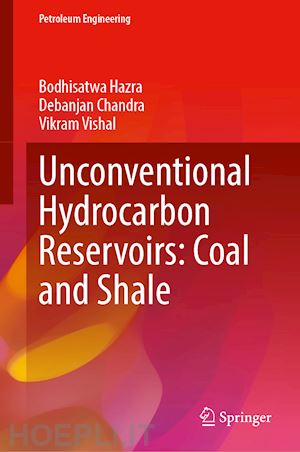

Questo prodotto usufruisce delle SPEDIZIONI GRATIS
selezionando l'opzione Corriere Veloce in fase di ordine.
Pagabile anche con Carta della cultura giovani e del merito, 18App Bonus Cultura e Carta del Docente
This informative book offers a comprehensive exploration of critical reservoir parameters, including quantification techniques and interpretations for evaluating these reservoirs. Readers will also gain insight into the fundamental principles of simulating gas production from coal and shale reservoirs, as well as the key input parameters for building the best-fit reservoir model. Additionally, the book explores various aspects of storing captured CO2 in these reservoirs and their potential role in preventing global temperature increases beyond pre-industrial levels.
Energy from conventional petroleum reservoirs and coal has been the backbone of global energy needs for a long time. However, depletion of these fossil fuel reserves, as well as their contribution to rising greenhouse emissions, has prompted a shift to renewable energy sources. Natural gas found in unconventional coal and shale reservoirs is increasingly seen as a greener energy option, emitting approximately 45% less CO2 than conventional sources. Furthermore, due to their vast availability and capacity to sequester atmospheric CO2, unconventional coal and shale reservoirs can facilitate the transition to renewable energy resources.
With a focus on achieving temperature stabilization at 1.5°C, this book offers a valuable resource for those interested in renewable energy and mitigating climate change.
Fundamentals of unconventional hydrocarbon reservoirs.- Recent advances in laboratory studies.- Upscaling for natural gas estimates in coal and shale.- Potential for CO2 sequestration in coal and shale.- Perspectives, Challenges and Opportunities.
Dr. Bodhisatwa Hazra, a Senior Scientist at CSIR-Central Institute of Mining and Fuel Research, Dhanbad, India, is currently working as a Visiting Scientist at the University of Kiel, Germany. He specializes in Petroleum Geochemistry, Organic Petrology and is currently focusing on unconventional reservoir geochemistry-petrophysics, and CO2 sequestration. Dr. Hazra obtained his PhD degree from Indian School of Mines, Dhanbad, on the shale-gas assessment of Raniganj basin, India. Dr. Hazra is a recipient of DST Inspire Faculty award, 2015 and CSIR Young Scientist Award, 2019. Currently, he serves as an Associate Editor of the Journal of Geological Society of India, and the Arabian Journal of Geosciences.
Dr. Debanjan Chandra, is a Postdoctoral Fellow at TU Delft. He received his PhD degree from Indian Institute of Technology Bombay on resolving the gas storage and migration behavior in shale and coal for enhanced gas recovery and CO2 storage applications. By combining reservoir permeability with rock mechanical properties, he attempted to quantify reservoir stability during enhanced hydrocarbon recovery. Dr. Chandra also used gas adsorption as well as X-ray and neutron scattering to assess the gas storage capacity of shale and coal reservoirs which were validated using 3D X-ray CT and 2D electron microscopic imaging.
Dr. Vikram Vishal is an Associate Professor at Indian Institute of Technology (IIT) Bombay, India, and holds a PhD degree jointly from IIT Bombay and Monash University, Australia. He has had brief professional stints at IIT Roorkee, Stanford University, Massachusetts Institute of Technology, Shell and Tata Steel Limited. Dr. Vishal specializes in reservoir geomechanics, unconventional petrophysics and geologic carbon sequestration. A two-time Fulbright Fellow and a two-time national awardee, Dr. Vishal is a recipient of several notable recognitions. He has received 2 patents, and authored over 100 research publications, five national roadmaps and four international reports in his domains of expertise.











Il sito utilizza cookie ed altri strumenti di tracciamento che raccolgono informazioni dal dispositivo dell’utente. Oltre ai cookie tecnici ed analitici aggregati, strettamente necessari per il funzionamento di questo sito web, previo consenso dell’utente possono essere installati cookie di profilazione e marketing e cookie dei social media. Cliccando su “Accetto tutti i cookie” saranno attivate tutte le categorie di cookie. Per accettare solo deterninate categorie di cookie, cliccare invece su “Impostazioni cookie”. Chiudendo il banner o continuando a navigare saranno installati solo cookie tecnici. Per maggiori dettagli, consultare la Cookie Policy.